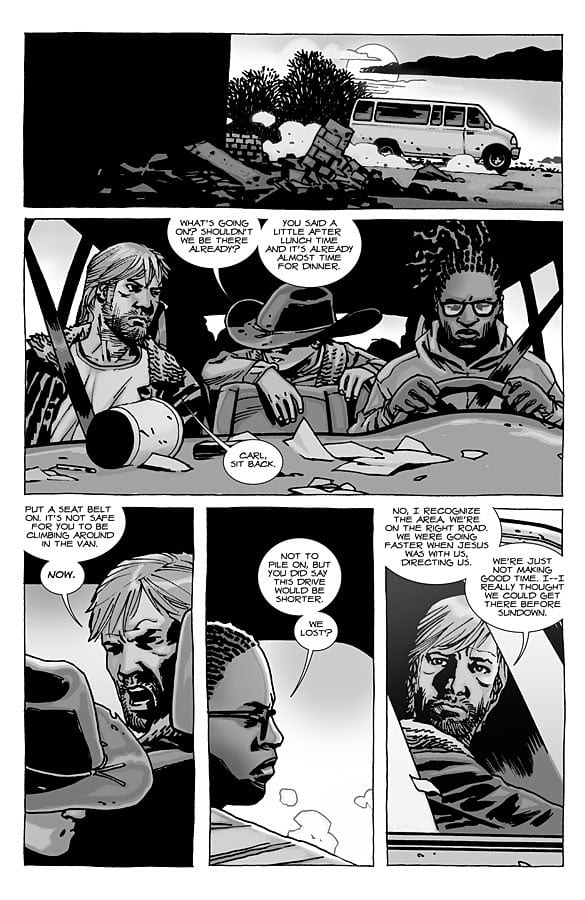The Walking Dead is a subtext-free comic. Writer Robert Kirkman's characters say exactly what they're thinking and feeling to anyone who asks at almost any time. On the rare occasions when they don't, they grunt things like, "It's okay, I'm fine," indicating the opposite just as clearly as if they'd stated it outright. The comic's cast of dozens features maybe six or seven memorable enough to recall by name at any given time, two or three of whom tend to have already been killed off. Its "find a safe zone/establish a life there/have that life threatened" narrative pattern may take longer and longer to work itself out with every repetition, like a spiral widening from the center out, but get there it does. It spawned a terrible television show.
Yet despite these problems, The Walking Dead remains one of the most compelling monthly genre comics on the stands, a read-it-first affair every time it comes out. Artist Charlie Adlard is a huge part of that, with his evocatively loose and wiry line, his palette of gray, and his ability to craft characters who look both tired and dangerous, like overstimulated dogs. It's a look that's hard to tire of. Beyond that, though, Kirkman's long-game slow-burn plotting may indeed have a recognizable pattern, but there's simply no telling when that pattern will get around to making itself recognizable, by which I mean when he'll start killing characters in sudden, unexpected, brutal, status-quo-upending fashion. When you pick up an issue of TWD, there's no telling who'll be left when you put it down. Your odds of any given issue featuring that kind of shock to the system may be low, but they exist (especially for the milestone issue numbers), which is more than you can say for all but probably under half a dozen monthly comics total. Despite, or because of, the increasing wait between payoffs, Kirkman finds a way to make them worth it, frequently far enough beyond worth it and into gobsmacking awe that he went there that it doesn't seem like a wait at all.
Issue #100 is a case in point. Directed against one of those six or seven characters by a glib talky asshole who comes across like a Brian Michael Bendis parody, its central outburst of violence easily the most deeply horrifying I've seen in a mainstream comic (no sneer quotes necessary for "mainstream" with The Walking Dead, this thing is legit popular with civilians) since, I suppose, the last time The Walking Dead went this far. In fact, you'd probably have to reach for Josh Simmons or Gilbert Hernandez to find a more thoroughly dehumanizing assault than the one we see here, and coming from me that's high praise indeed. Assaults should be dehumanizing.

It's hugely graphic and gory, but more importantly it's predicated on anguish and agony, on a character begging for their life and slowly losing it anyway, in view of other characters, including children, made to watch as punishment. A "bad guy" is committing the violence, but its horribleness is quite of a piece with the series' presentation of human-on-human violence overall. The Walking Dead may not go quite as far as its TV incarnation's sister show Breaking Bad in depicting its protagonist's growing propensity for violence as loathsome, but lead character Rick Grimes is clearly intended as a cautionary tale of the way violence reduces the humanity of its perpetrators, even in cases where the violence is deemed necessary for survival. In some ways the series' most shocking move in recent issues was when Rick announced that the group of zombie-apocalypse survivors he leads should trade with other nearby communities not in goods or services, but in their ability to wield violence effectively. Killing is his business and business is good. The events of the hundredth issue simply put Rick in contact with a better businessman.
Zombie fiction, or really any popular genre or subgenre fiction, in which violence is depicted as uniformly withering to human potential is something to be celebrated, I think. They don't come much more withering than this.







